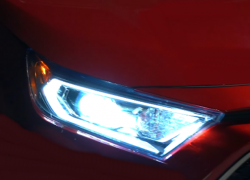
— Toyota RAV4 adaptive headlights caused a lawsuit that has now been dismissed, but the federal judge ruled the plaintiffs can amend and refile their class action for at least some of the claims.
The class action lawsuit alleges Toyota knowingly misrepresented 2022 RAV4 SUVs were equipped with adaptive headlights when they were not. The four plaintiffs claim they relied on the misrepresentations when they purchased the RAV4s.
According to the class action lawsuit:
"Adaptive headlights make cars safer to drive at night because the headlights’ 'sensors cause them to automatically adjust the angle of the lighting when the driver turns the steering wheel,' which means that the headlights 'pitch the low beams toward the inside of the corner of a turn. By angling the headlights in the direction of travel, the Adaptive Headlights widen the area that the lights cover and illuminate the direction of travel,' not just the sides of the road."
The lawsuit alleges the window stickers for "several" of the RAV4s indicated the vehicles were equipped with adaptive headlights.
The original plaintiff purchased her Toyota RAV4 in 2022, and she asserts she read marketing materials which said the RAV4 was equipped with adaptive headlights.
She “reviewed the Monroney label [window sticker] on the vehicle she purchased, which included the Adaptive Headlights as a feature of the premium package on her vehicle.” When she bought the SUV, she thought the SUV had the adaptive headlights “and paid a higher price . . . under th[at] mistaken belief.”
But on July 9, 2022, Toyota sent a letter telling her, “it has recently come to our attention” the Monroney label on her RAV4 said that it had adaptive headlights but in fact the feature wasn't included.
Toyota told her the window sticker was wrong because adaptive headlights was a feature, "not standard on your model."
Toyota also assured the plaintiff the price of the adaptive headlights, "was not included in the MSRP.” In other words, from the beginning she was not charged for the adaptive headlights feature.
The plaintiff filed the class action by alleging Toyota refused to take steps to replace the RAV4, install the adaptive headlights or give her a refund.
An additional three plaintiffs were later added to the class action lawsuit, and all allege the same claims as Shu.
The adaptive headlights lawsuit includes these vehicles:
- 2022 Toyota RAV4 Prime
- 2022 Toyota RAV4 SE Hybrid
- 2022 Toyota RAV4 XSE
- 2022 Toyota RAV4 XSE Hybrid
- 2022 Toyota RAV4 XLE
- 2022 Toyota RAV4 XLE Hybrid
- 2022 Toyota RAV4 XLE Premium
- 2022 Toyota RAV4 XLE Premium Hybrid
- 2022 Toyota RAV4 Adventure
- 2022 Toyota RAV4 TRD Off-Road
- 2022 Toyota RAV4 Limited
- 2022 Toyota RAV4 Limited Hybrid
According to the plaintiffs, Toyota “knew that the RAV4 vehicles it sold and leased in the United States did not contain the adaptive headlights" The plaintiffs contend the RAV4 advertising materials and window stickers were false and deceptive.
Toyota RAV4 Adaptive Headlights Lawsuit Dismissed
In a motion to dismiss the Toyota lawsuit, the automaker argued no customers were charged for adaptive headlights.
Toyota told the judge that plaintiff Shu doesn't assert she even tried to discuss the adaptive headlights with Toyota before she filed the class action. In addition, the plaintiff didn't file the lawsuit until Toyota sent a letter informing her the RAV4 window stickers were wrong.
After the judge studied arguments from both sides, the class action lawsuit was completely dismissed.
The judge notes some of the claims against Toyota now asserted by the plaintiffs were not alleged in the original lawsuit.
As an example, Judge Laurel Beeler referenced allegations made in the original class action lawsuit regarding marketing materials which the plaintiffs claim they relied upon when buying the vehicles.
"However, 'the plaintiffs submitted screenshots and PDFs of the marketing materials and websites. In their opposition, they use the exhibits to show that Toyota corrected its misrepresentations by August 2022. These facts are not in the complaint [lawsuit].'" — Judge Beeler
The judge also agreed the plaintiffs contend Toyota's actions were fraudulent, but “[t]he circumstances constituting the fraud must be ‘specific enough to give defendants notice of the particular misconduct which is alleged to constitute the fraud charged so that they can defend against the charge and not just deny that they have done anything wrong.’”
In another example, the original lawsuit referred to brochures (plural) but the latest documents from the plaintiffs refer to only a single brochure.
The judge also found Toyota made fair points about why the generic allegations in the RAV4 class action are inadequate.
"[O]ne cannot tell what the plaintiffs saw and how they saw it (e.g., from mailings, on the websites for the dealerships or Toyota, or otherwise). As the defendants point out, courts have required plaintiffs to identify the specific advertisements and promotional materials that they relied on, and when they saw them." — Judge Beeler
Another dismissed claim involved how Ms. Shu argued Toyota knew the RAV4s weren't equipped with adaptive headlights at the time the vehicles were sold.
But the judge ruled Shu failed to plead Toyota had "pre-sale knowledge" that the Monroney label and other materials were incorrect. The plaintiff also failed to plead Toyota had a specific intent to defraud customers.
Although the judge dismissed the Toyota adaptive headlights lawsuit, the judge gave leave to amend the class action lawsuit, minus a few claims.
The adaptive headights class action includes California plaintiff Sharlene Shu, and New York plaintiffs Mark Tengowski, Roman Sivion and Mohamed Almakaleh. All the plaintiffs purchased 2022 Toyota RAV4 SUVs.
The Toyota RAV4 adaptive headlights lawsuit was filed in the U.S. District Court for the Northern District of California: Sharlene Shu, et al., v. Toyota Motor Sales USA, Inc., et al.
The plaintiff is represented by Gutride Safier LLP.




